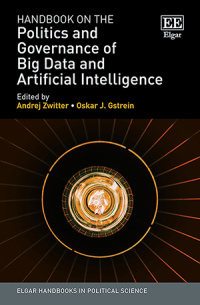
Hardback
Research Handbook on Law and Technology
全面和深刻的研究手册侦察structs the scholarly discourses surrounding the field of law and technology, discussing the salient legal, governance and societal problems stemming from the use of different technologies, and how they should be treated under various legal frameworks.
This title contains one or more Open Access chapters.
This title contains one or more Open Access chapters.
More Information
Contributors
More Information
全面和深刻的研究手册侦察structs the scholarly discourses surrounding the field of law and technology, recognising how it has been established over the last decade as one of the focal points of legal scholarly debate.
Adopting a multidimensional approach, the Research Handbook on Law and Technology brings together an array of esteemed experts and new voices in the field with chapters considering antitrust, artificial intelligence, consumer law, legal responses to techlaw uncertainties, internet, methodology, and human rights in the digital age. Contributors examine the interaction between various branches of law and technology and analyse specific challenges that technology poses to law and legal scholarship, using theoretical reasoning and case-specific examples to support key arguments. Ultimately, this Research Handbook encourages a critical approach when engaging with discussions on law and technology, arguing that our understanding can only be improved and developed by challenging existing paradigms.
The Research Handbook on Law and Technology is a fundamental resource for legal students, academics, researchers and practitioners interested in the legal challenges stemming from the use of different technologies. Providing a comprehensive examination of technology’s multidisciplinary nature, this book will also appeal to academics in the fields of philosophy, social science, political science and public policy.
Adopting a multidimensional approach, the Research Handbook on Law and Technology brings together an array of esteemed experts and new voices in the field with chapters considering antitrust, artificial intelligence, consumer law, legal responses to techlaw uncertainties, internet, methodology, and human rights in the digital age. Contributors examine the interaction between various branches of law and technology and analyse specific challenges that technology poses to law and legal scholarship, using theoretical reasoning and case-specific examples to support key arguments. Ultimately, this Research Handbook encourages a critical approach when engaging with discussions on law and technology, arguing that our understanding can only be improved and developed by challenging existing paradigms.
The Research Handbook on Law and Technology is a fundamental resource for legal students, academics, researchers and practitioners interested in the legal challenges stemming from the use of different technologies. Providing a comprehensive examination of technology’s multidisciplinary nature, this book will also appeal to academics in the fields of philosophy, social science, political science and public policy.
Contributors
Contributors include: Francisco De Abreu Duarte, Binit Agarwal, BJ Ard, Roger Brownsword, Bartosz Brożek, Giuseppe Colangelo, Zachary Cooper, Rebecca Crootof, Helen Eenmaa, A. Michael Froomkin, Angelo Golia, Giovanni de Gregorio, Simon Halliday, Kasper Hedegård Schiølin, Tatjaana Heikkinen, Mireille Hildebrandt, Hanne Hirvonen, Claudia Victoria Ionita, Agnieszka Jabłonowska, Machiko Kanetake, Olia Kanevskaia, Riikka Koulu, Ewa Laskowska-Litak, Arno Lodder, Jed Meers, Hans-Wolfang Micklitz, Neha Mishra, Caroline B Ncube, Magdalena Pacholska, Przemysław Pałka, Thabiso Phiri, Eleonora Pierucci, Artur Pericles Lima Monteiro, Andrzej Porębski, Leonie Reins, Lachlan Robb, Sofie Royer, Suvi Sankari, Burkhard Schafer, Dan Traficonte, Kieran Tranter, Joe Tomlinson, Rune Vanleeuw, Ramsi A. Woodcock, Raphaële Xenidis



